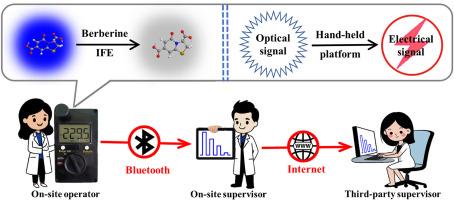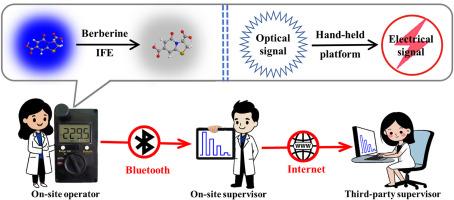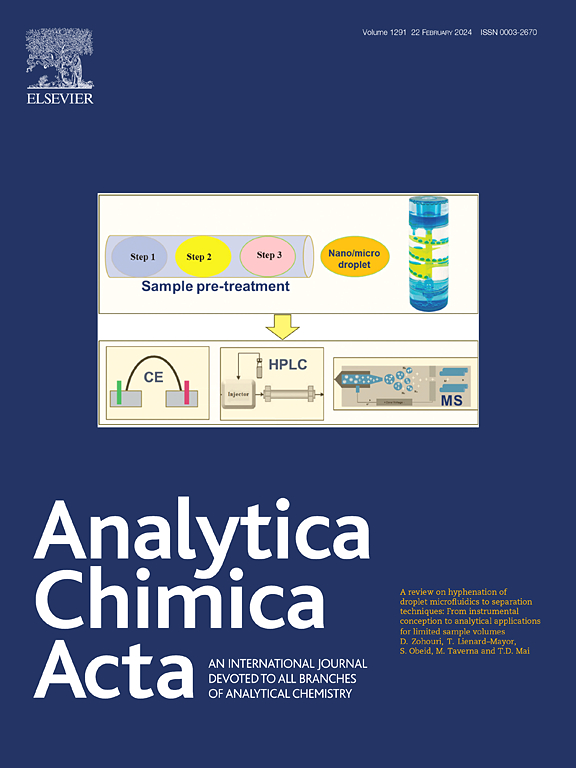开发精确的同步传输信号手持传感平台,用于基于荧光的小檗碱现场检测
IF 5.7
2区 化学
Q1 CHEMISTRY, ANALYTICAL
引用次数: 0
摘要
背景小檗碱的抗菌谱广,毒副作用小,因此被广泛用于临床治疗。然而,滥用小檗碱可能会导致细菌耐药性和其他一些不良影响。此外,测定环境水样中的小檗碱含量有助于监测其在生态系统中的积累和代谢。传统的检测方法通常需要在实验室进行,涉及复杂的处理程序,不仅耗时,而且不利于快速反应和决策。因此,有必要开发便携式仪器,为小檗碱的添加和摄入提供合理的指导,以减少其滥用带来的危害。结果在这项工作中,利用光电转换技术、蓝牙技术、远程同步信号技术、电学技术和3D打印技术,开发了一种低成本、易制造、可独立使用的精确同步传输信号手持传感平台(STSHSP)。为了验证 STSHSP 的性能,设计并合成了一种具有超高量子产率的 5-oxo-2,3-dihydro-5H-thiazolo [3,2-a] pyridine-3,7-dicarboxylic acid(TPDCA)作为探针。TPDCA 在 365 纳米紫外光下发出明亮的蓝色荧光,小檗碱可通过内滤光片效应将其淬灭。在 0.1 - 80 μg/mL 范围内,所制备的 STSHSP 显示的电压与小檗碱浓度具有良好的线性关系(R2 = 0.9997),检测限为 28.32 ng/mL。该便携式传感器在检测实际河水、尿液、中药及其制剂样品时表现出良好的稳定性、准确性和可靠性。值得庆幸的是,该设备能将信息实时传输到控制中心和/或第三方监管机构,有效消除了信任危机。该传感器在环境水质检测和药品安全领域具有广阔的应用前景。本文章由计算机程序翻译,如有差异,请以英文原文为准。


Development of an accurate synchronous transport signal hand-held sensing platform for fluorescence-based berberine on-site detection
Background
Berberine is widely used in clinical treatment because of its wide antibacterial spectrum and low toxic side effects. However, its abuse could lead to bacterial resistance and several other adverse effects. In addition, measuring the content of berberine in environmental water samples helps to monitor its accumulation and metabolism in ecosystems. Traditional detection methods usually need to be carried out in the laboratory, involving complex processing procedures, which are not only time-consuming, but also unfavorable for rapid response and decision-making. Therefore, it is necessary to develop portable instruments to provide reasonable guidance on the addition and intake of berberine to reduce the harm caused by its abuse.
Results
In this work, an accurate synchronous transport signal hand-held sensing platform (STSHSP) with a low-cost, easy-to-manufacture, independent use was developed by using photoelectric conversion technology, Bluetooth technology, remote synchronous signal technology, electrical technology, and 3D printing technology. To verify the performance of STSHSP, a 5-oxo-2,3-dihydro-5H-thiazolo [3,2-a] pyridine-3,7-dicarboxylic acid (TPDCA) with ultra-high quantum yield was designed and synthesized as a probe. TPDCA exhibited bright blue fluorescence under the ultraviolet light of 365 nm which could be quenched by berberine through the inner filter effect. In the range of 0.1–80 μg/mL, the voltage displayed by the prepared STSHSP has a good linearity with the berberine concentration (R2 = 0.9997) with a detection limit of 28.32 ng/mL. The portable sensor demonstrated good stability, accuracy, and reliability in detecting actual river water, urine, traditional Chinese medicine, and its preparation samples.
Significance
The sensor with its compact structure, portability, and simple operation was suitable for in-situ detection with accurate, reliable, and feasible results, which is beneficial for improving drug quality and ensuring human health. Fortunately, the device could transmit the information to the control center and/or a third-party supervision institution in real-time, which could effectively eliminate the trust crisis. The sensor has broad application prospects in the field of environmental water quality detection and drug safety.
求助全文
通过发布文献求助,成功后即可免费获取论文全文。
去求助
来源期刊

Analytica Chimica Acta
化学-分析化学
CiteScore
10.40
自引率
6.50%
发文量
1081
审稿时长
38 days
期刊介绍:
Analytica Chimica Acta has an open access mirror journal Analytica Chimica Acta: X, sharing the same aims and scope, editorial team, submission system and rigorous peer review.
Analytica Chimica Acta provides a forum for the rapid publication of original research, and critical, comprehensive reviews dealing with all aspects of fundamental and applied modern analytical chemistry. The journal welcomes the submission of research papers which report studies concerning the development of new and significant analytical methodologies. In determining the suitability of submitted articles for publication, particular scrutiny will be placed on the degree of novelty and impact of the research and the extent to which it adds to the existing body of knowledge in analytical chemistry.
 求助内容:
求助内容: 应助结果提醒方式:
应助结果提醒方式:


